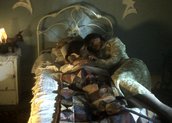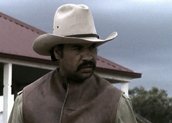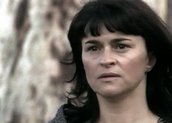


One Night the Moon (2001)
Synopsis
One Night the Moon is a film based on events that took place in 1932, about a young girl who goes missing on the night of a full moon. Her family, though desperate to find her, fail to employ the skills of a local tracker Albert Riley (Kelton Pell) due to their own racism.
Curator’s notes
A beautifully directed film, with sweeping cinematography that captures the magnificence of the Flinders Ranges where the film is shot, One Night the Moon is based on Michael Riley’s film about his grandfather, Black Tracker (1997). It was originally made for television as part of a funding initiative – mdTV (Music Drama Television) with the intention of making the arts an integral part of the film.
Director Rachel Perkins collaborated with cinematographer Kim Batterham to stylistically ensure that the landscape was the central feature of the film, framing the human drama that unfolds. The father (Paul Kelly), mother (Kaarin Fairfax) and daughter Emily (Memphis Kelly) are positioned as newcomers, whose unawareness of the land and the desire to civilize and possess it, is greatly thwarted by their own ignorance. So the land is made central to the drama through the care and attention to detail exercised by director and cinematographer, creating a duality rarely achieved in cinema; and that is the empathy that is afforded to Albert Riley (Kelton Pell), as well as the landscape, while not detracting from the mother’s story.
One Night the Moon originally focused on the story of Albert, and when Perkins joined the creative team as director, a draft script was already in place. Perkins was influential in ensuring that the story shifted from the tracker Albert Riley, to the mother’s story of loss when her daughter goes missing. Even so, the story of Albert, the central Indigenous character, is not lost due to the shift of focus, as the land in becoming the central character, becomes synonymous with Albert’s position and perspective, and Albert, though originally excluded on the grounds of racism, is eventually vindicated.
One Night the Moon reintroduces song into the Australian landscape, for Indigenous peoples have always used song to talk about the land, and song itself has been one of the central means of land management. The musical collaboration between Kev Carmody, Mairead Hannan and Paul Kelly complements the visual style of the film, and what results is a beautiful, seamless film with the ability to transport the audience. Rachel Perkins is an influential filmmaker whose other works include AFI Award winning Radiance, Freedom Ride – based on the work of her late father Dr Charles Perkins. Rachel was the artistic director of Yeperenye, the concert held in Alice Springs in 2001 to mark Indigenous Federation.
- Overview
- Curator’s notes
- Video 3 clips
- Principal credits
- Find a copy
- Comments 1
- Map
- Add your review



